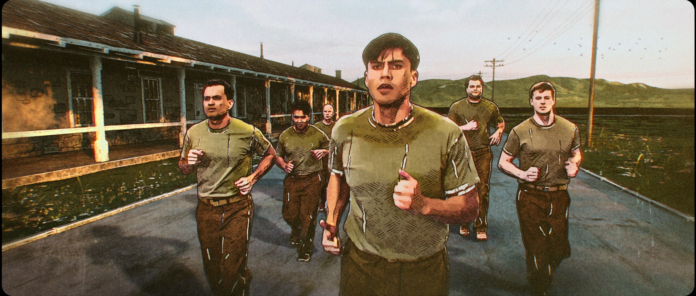
Netflix on Nov. 11 launched its new series “The Liberator,” which retells the story of the 2012 Alex Kershaw book of the same title. The show follows Coloradan Lt. Felix Sparks as he leads the 157th infantry brigade in critical World War II Western Theater operations, but it only teases Sparks’ subsequent successful law career in Colorado.
Sparks was born in San Antonio in 1917 and grew up in Arizona before enlisting in the Army in 1935, when he was unable to find sustained employment elsewhere at the height of the Great Depression. Sparks completed his military training and returned to Arizona where he started studying law but only finished his first semester before he was drafted to fight overseas in WWII.
By 1943, Sparks found himself entrenched in Allied efforts to regain ground in Europe as the war raged through the region. He started with Operation Husky and later was one of only two survivors of the “Battle of the Caves” at Anzio, Italy. As the war neared its conclusion, Sparks edged closer and closer to Germany by way of a newly liberated France. He was among the first Allied forces to enter and liberate the Dachau concentration camp. Some controversy still surrounds that initial liberation wave as reports of investigations into the U.S. military’s treatment of camp officials and stationed soldiers began circulating. Sparks was candid at the time and in later years about the level of upheaval, distress and confusion on the scene.
While Sparks’ military accolades and various strategic activities were detailed in “The Liberator,” few knew until the end of the series that he had an entirely separate claim to fame in Colorado with his time on the state Supreme Court and in the drafting of many of the state’s water laws.
“I think he would have fought a duel to save Colorado water for Coloradans.” —former Gov. Dick Lamm
His law career finally began after he returned from the war, and he graduated from the University of Colorado Law School in 1947. His private practice in Delta, Colorado, earned him the acclaim and reputation needed to secure the district attorney seat there. By 1952, Sparks had been appointed to an unexpired, short-term seat on the Supreme Court after the sudden death of Justice John Clark. During that time, he helped decide such cases as Hill v. District Court in 1956, molding the water laws of the land for coming decades.
Sparks served as the director of the Colorado Water Conservation Board and he assisted with the 1958 formation of the Colorado “Water Congress,” according to research compiled by Kathy Plonsky, a research attorney at the Colorado Supreme Court.
“In stressing the need for state unity, Sparks echoed and complemented the strategy for a unified statewide water program advocated by Congressman Wayne Aspinall,” said water law historian Steven Schulte. “Sparks and Aspinall would help lead Colorado toward greater unity in the volatile 1960s.”
Sparks contributed to the drafting of late 1960s legislation focused on water protection for the Upper Basin. Eventually, he provided input for the drafting of the 1969 Water Right Determination and Administration Act, which divided Colorado into seven water divisions with a water judge assigned to each. According to Plonsky’s research, “Sparks felt it was important to include language reflecting that ‘the Constitution guarantees a right to appropriate, not speculate.’ To prevent speculation, a proposed user must be committed to beneficially using the water.”
Sparks also served in the Colorado Army National Guard during the bulk of the 1960s and ’70s.
He died in Colorado of pneumonia at 90 in 2007 but his legacy lives on in two books based on his life and military ventures, and now, the Netflix series.
“Colorado can never repay Felix for the way he protected Colorado water,” said former Gov. Dick Lamm, according to Plonsky, “I think he would have fought a duel to save Colorado water for Coloradans.”
This article appeared in the Nov. 23 issue of Law Week Colorado. To read other articles from that issue, order a copy online. Subscribers can request a digital PDF of the issue. zp-pdl.com

